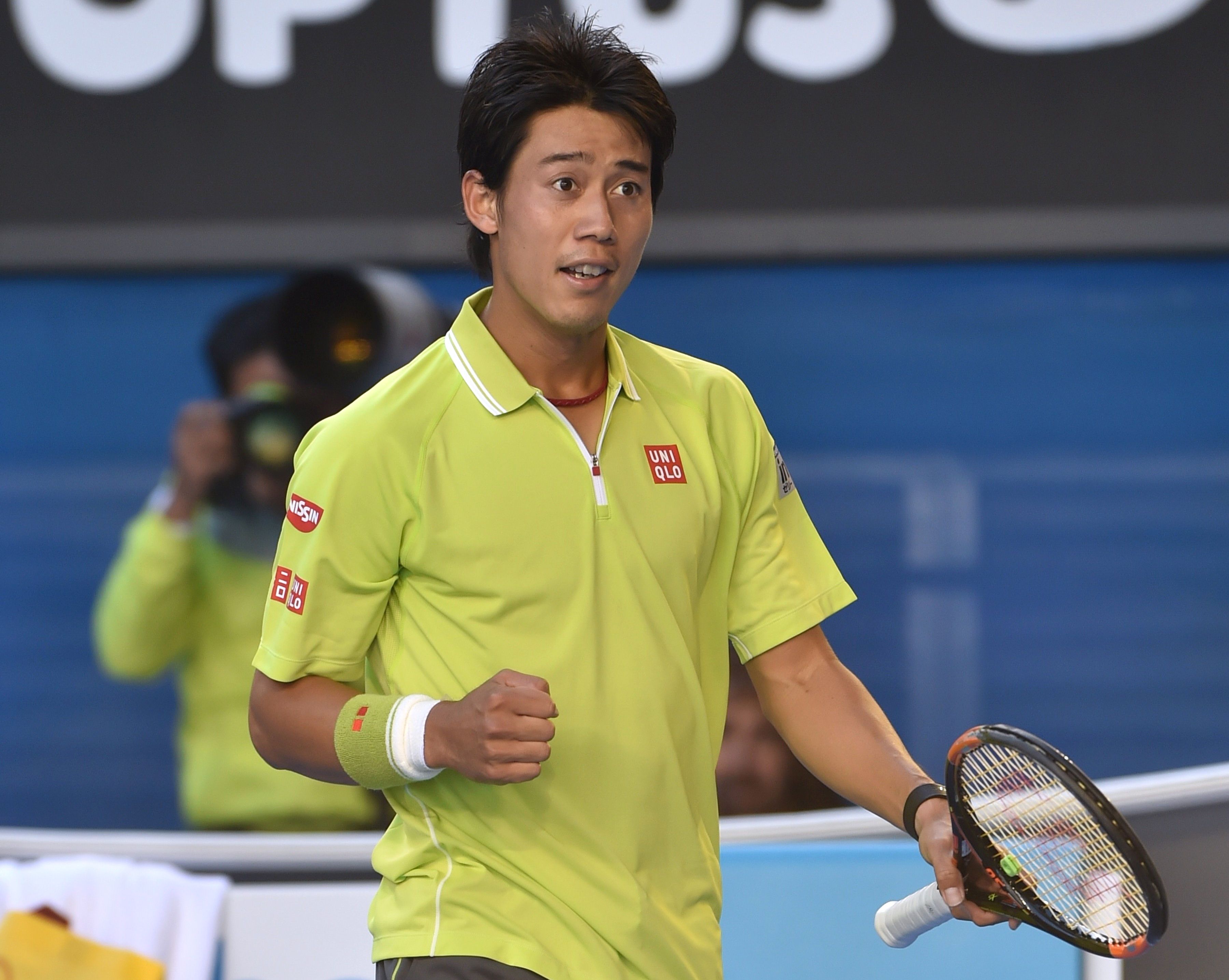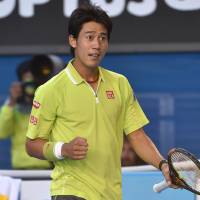What a difference three years makes.
When Kei Nishikori made the quarterfinals of the Australian Open back in 2012, it was such a big deal that NHK bought the rights to the match and aired it live here in the middle of the day.
Nishikori lost in straight sets to Andy Murray, but his historic achievement was still greeted with joy by Japanese fans and the media. With the Shimane native now ranked No. 5 in the world and having progressed to the final of the U.S. Open last year, the expectations for his showing at this year's first Grand Slam were sky high.
After his straight sets victory over David Ferrer in the fourth round on Monday, it looked like Nishikori could meet world No. 1 Novak Djokovic in the semifinals. But it wasn't meant to be as Nishikori fell to defending champion Stan Wawrinka in straight sets in the quarterfinals on Wednesday.
Nishikori's supporters were naturally disappointed, but they should not dwell on his exit too much as he played well in his four victories. Luck plays a part in sports and life, and in this case it was not on Nishikori's side. I think if he had been in the other half of the draw, away from Wawrinka and Djokovic, he very likely would have made his second straight Grand Slam final.
What I found most encouraging was the high praise given Nishikori by analysts commentating on his matches at Melbourne Park. "Lightning fast" and the "quickest player on the Tour" are just a few examples that I heard on Tennis Channel and ESPN telecasts.
Even more impressive was the recent insight of eighth-time Grand Slam champion Andre Agassi, who won the Australian Open four times.
Nishikori was featured on the Asia edition of Time magazine earlier this month and Agassi said of the 25-year-old superstar in the accompanying article, "Kei is one of the few players that I would pay money to see play. He's one of the greatest shotmakers in the game, so I don't see why he can't proceed further (up the rankings)."
Can't say I'm surprised by the early exit of the Samurai Blue at the Asian Cup in Australia. Coming off the disappointing showing at last summer's World Cup and in the wake of all of the controversy surrounding coach Javier Aguirre, there was a sense of foreboding going into the competition.
It would be one thing if Japan had lost to one of its regional rivals like Australia or South Korea, but going out to the United Arab Emirates — a nation of 9 million people ranked 80th — compounded the defeat. Just as in Brazil, the outcome reflects on the players, not the coach.
Aguirre, who has been embattled recently over a match-fixing charge dating back to 2011 when he was the manager of Spanish side Real Zaragoza, has hung on to his job for the time being. It will be interesting to see how the JFA deals with the matter going forward.
One soccer analyst was on target when he told me, "If Aguirre is fired, they need to get rid of the guy (JFA technical director Hiromi Hara) who hired him."
I completely agree.
I could never understand the haste with which Aguirre was hired. Then all of the contract details were leaked out before he had even signed the deal.
The real question here is whether the JFA failed in its mission of due diligence before the hiring or is just a victim of bad luck. Its track record tells me it is likely the former.
Interesting move by the Japan 2024 Task Force to make former J. League chairman Saburo Kawabuchi the leader of the group enlisted to get the Japan Basketball Association's global ban by FIBA lifted and chart a course for the future of the game.
Normally I would not be too enthusiastic about a 78-year-old retiree leading such an important mission, but Kawabuchi was instrumental in the formation of the J.League by thinking big and that is exactly what basketball in this country needs.
The man has gravitas and respect.
Enough of the minions in both the NBL and the bj-league who, nine years after Japan hosted the world championships, have not been able to get out of their own way. The damage done since 2006 has been exponential and made the country a laughingstock in the world basketball community.
It has been an absolute disgrace.
A source says Kawabuchi is already proposing that the new merged league "have arenas with a minimum capacity of 5,000, teams have a permanent practice court, and player salaries be at least ¥10 million."
Realizing all of these goals may be easier said than done. But let's give Kawabuchi credit. He already has a vision in mind. The parties from both leagues would be wise to get behind him with their full support.
Boston's 2024 Olympic bid looks like it may be dead on arrival. When a city is selected to represent its country with an Olympic bid, there is generally a natural upswing in public support. Not in this case.
As the Chicago Tribune's Phil Hersh reported this week, things are looking pretty grim for the bid in both the state and the city.
" . . . a statewide poll released Wednesday by the Emerson College Polling Society, asked the question, "Do you want Boston to be the host city for the 2024 Summer Olympics?" Respondents said "no" by a 48-42 margin.
"The closer to Boston, the lower the support: in Suffolk County, where Boston is the county seat, the poll showed 59 percent opposed and just 36 percent for."
Good grief.
Interesting quotes from 16-year-old Russian skater Julia Lipnitskaia, who finished second at the world championships in Saitama last year, about life in the media spotlight from a story on the country's skating federation website a while back.
"Whatever you do, everything is interpreted the wrong way and then has to be justified," Lipnitskaia said. "It's not life, it's constant stress.
"I'm a person like everyone else. I try to work on the things people expect of me, but I can't live up to everyone's desires and whims."




















With your current subscription plan you can comment on stories. However, before writing your first comment, please create a display name in the Profile section of your subscriber account page.